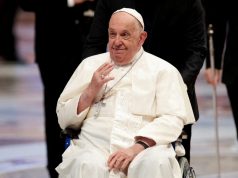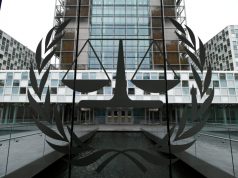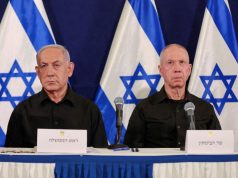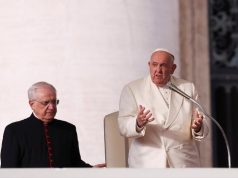
NEW YORK — Columbia University on Monday canceled its main graduation ceremony after weeks of pro-Palestinian protests roiled the Ivy League college’s campus, but it will still hold smaller, school-based events.
READ: Explainer: What is behind the pro-Palestinian protests at US universities?
“Holding a large commencement ceremony on our campus presented security concerns that unfortunately proved insurmountable,” said Columbia spokesperson Ben Chang. “Like our students, we are deeply disappointed with this outcome.” Graduation had been scheduled for May 15.
Chang said the university had sought an alternative venue but was unable to find one that could accommodate the students, families, and guests in attendance, who normally exceed 50,000.
The protests at Columbia, which drew national attention, have inspired similar demonstrations at dozens of universities around the country. Students have called for a ceasefire in Gaza and have demanded their schools divest from companies with ties to Israel.
U.S. rapper Macklemore dropped a new track on Monday summing up many of the protesters’ views.
On Monday, the Palestinian militant group Hamas agreed to a Gaza ceasefire proposal from mediators, but Israel said the terms did not meet its demands and pressed ahead with strikes in Rafah while planning to continue negotiations on a deal.
During the seven-month-old war more than 34,600 Palestinians have been killed in Israel’s military operations in Gaza, according to health officials in the Hamas-ruled Palestinian enclave.
The war began when Hamas militants attacked Israel on Oct. 7, killing about 1,200 people and abducting 252 others, of whom 133 are believed to remain in captivity in Gaza, according to Israeli tallies.
As protests gathered steam at U.S. colleges, some universities, including Columbia, called in riot police wielding batons and flash-bang grenades to disperse and arrest hundreds of protesters, citing a paramount need for campus safety. Civil rights groups have decried such tactics as unnecessarily violent infringements on free speech.
The turmoil on campuses has prompted colleges across the United States to relocate, modify or cancel commencement ceremonies altogether. The University of Southern California also called off its main-stage ceremony, one week after canceling the valedictorian speech by a Muslim student who said she was silenced by anti-Palestinian hatred.
Columbia said on Monday it had consulted with student leaders in deciding how to handle graduation. The majority of the smaller ceremonies, which had been set to take place on its upper Manhattan campus, where most of the protests have taken place, will take place at the main athletic complex about five miles (8 km) away.
A block away from campus, about 200 pro-Israeli demonstrators staged their own protest on Monday to commemorate the Holocaust and denounce what they see as antisemitism and anti-Jewish harassment coming from campus protests.
“We can understand that there is evil in the world and that some people can do horrific and terrible things. But how can we understand the response by far too many people, including the so-called elites, including so-called Ivy League universities?” Elan Carr, chief executive of the Israeli American Council, told the demonstration.
Across town, pro-Palestinian protesters marched on the Met Gala, a glitzy ball to benefit the New York Metropolitan Museum of Art. Police said they made multiple arrests but there were no reports of injuries.
READ: Grape-accented Zendaya leads garden-themed looks at Met Gala
The demonstrations have emerged as a political flashpoint during a contentious U.S. election year as Democratic President Joe Biden and Republican former U.S President Donald Trump face off in a rematch for the White House.
Rally for Israel, Jewish students
Republican U.S. House of Representatives Speaker Mike Johnson — who condemned Columbia’s administrators, accusing them of being too lenient on demonstrators during a campus visit in April — blasted them again on Monday, saying the decision to cancel commencement denied thousands of graduates the recognition they deserved.
Johnson also called on the school’s board of trustees to remove university President Minouche Shafik, adding that the cancellation showed she would rather “cede control to Hamas supporters than restore order.”
New York City police cleared a Columbia building last week that had been barricaded by pro-Palestinian protesters, arresting more than 100 people in and around the campus and dismantling an encampment.
Other U.S. universities have continued grappling this week with how to clear their campuses of protesters.
Protesters at the Massachusetts Institute of Technology in Cambridge near Boston mostly cleared a pro-Palestinian encampment after administrators said they would face immediate suspension unless they left.
“Given developments over the past several days, I must now take action to bring closure to a situation that has disrupted our campus for more than two weeks,” MIT President Sally Kornbluth said in a statement announcing the order to vacate.
But hundreds of protesters returned later on Monday evening, tore down police barricades surrounding the encampment, and locked arms.
At nearby Harvard University, interim President Alan Garber said on Monday that protesters who continued participating in a two-week-old encampment would be referred for “involuntary leave,” meaning they may not be able to sit for exams, reside in Harvard housing or be on campus until reinstated.
— Reporting by Julia Harte, Doina Chiacu, Joseph Ax, Brian Snyder, Ross Kerber and Daniel Trotta; editing by Jonathan Oatis, Cynthia Osterman and Michael Perry









